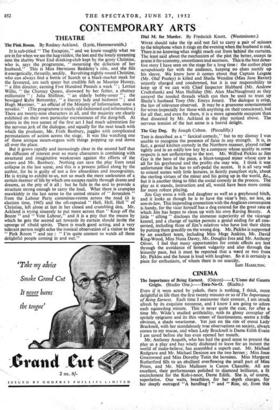CONTEMPORARY ARTS
THEATRE
Tlie'Pink Room. By Rodney Ackland. (Lyric, Hammersmith.) Ir is sub-titled " The Escapists," and we -know roughly what we are in for when we see the hag-ridderi, the lost and the lonely streaming into the shabby West End drinking-club kept by. the ginny Christine, who is, says the programme, " mourning the defection of her husband.' This is Miss Hermione Baddeley's role, and she fills it energetically, throatily, seedily. Revolving nightly round.Christine, who can always find a bottle of Scotch or a black-market steak for the favoured, are such queer but credible fish as Maurice Hussey, " a film director, earning Five Hundred Pounds a week " ; Lettice Willis, " the Chutney Queen, disowned by her father, a chutney millionaire " ; Julia Shillitoe, " an elderly bobby-soxer " ; the bewigged Ruby Bottomley, " a literary lady and hedonist " ; and Hugh Marriner, " an official of the Ministry of Information, once a novelist." (The programme is nicely qld-fashioned and informative.) There are twenty-nine characters in all, and the majority are clearly exhibited on their own particular excrescences of the dung-hill. At points in the two scenes of the 'first act I had much admiration for the nervous jerk of the dialogue, and equally for the neat touch with which the producer, Mr. Frith Banbury, juggles with complicated permutations of action across the stage. It was like watching one of those antique steam-organs with things pepping up and down all over the place.
But it grows rapidly and increasingly clear in the second half that the diffusion of interest over so many characters is combining with structural and imaginative weaknesses against the efforts of the actors and Mr. Banbury. Nothing can save the play from total collapse in the last scene, and this is a process jollied along by the author, for he is guilty of not a few absurdities and incongruities. He is trying to exhibit to us, not so much the mere uselessness of a certain manner of life by which one escapes reality through drams and dreams, as the pity of it all ; but he fails in the end to provide a structure strong enough to carry the load. What there is crumples mawkishly in the last scene to the united strains of " Jerusalem " from the Labour Party committee-rooms across the road (it is election time, 1945) and the oft-repeated " Hell, Hell, Hell " of Christine, left alone at last in her closed and crumbling den. Mr. Ackland is trying sincerely to put more across than " Keep off the Booze " and " Vote Labour," and it is a pity that the means by which he gets the second act towards its curtain should invite the upsurge Of ribald spirits. There is much good acting, and a very tolerant person might echo the ironical observation of a visitor to the " Pink Room " and say : " I'm quite content to watch all these delightful people coming in and out."


































 Previous page
Previous page